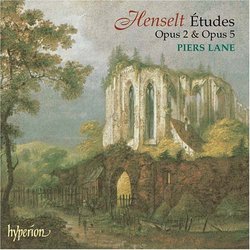| All Artists: Adolf Henselt, Piers Lane Title: Henselt: Études Opus 2 & Opus 5 Members Wishing: 0 Total Copies: 0 Label: Hyperion UK Release Date: 2/8/2005 Album Type: Import Genre: Classical Styles: Chamber Music, Historical Periods, Classical (c.1770-1830) Number of Discs: 1 SwapaCD Credits: 1 UPC: 034571174952 |
Search - Adolf Henselt, Piers Lane :: Henselt: Études Opus 2 & Opus 5
CD Details |
CD ReviewsThe "Northern Chopin" or His Own Continent? Hexameron | 08/31/2006 (5 out of 5 stars) "Adolph von Henselt (1814-1889) was one of the greatest piano virtuosi of the 19th century and a composer of superior piano music. His compositional output is thin and his known published works even smaller. In that regard he reminds me of Alban Berg, whose single digit opus numbers are the sign of a self-critical composer. Henselt's best known work is the Piano Concerto in F minor Op. 16, but even that does not emerge too often in the recording world. Michael Ponti and recently Marc-Andre Hamelin recorded this phenomenal work (The Romantic Piano Concerto, Volume 1 | Henselt: Piano Concerto, Op. 16; Variations de Concert, Op. 11; Alkan: Concerto da Camera, Op. 10/1; Concerto da Came). Henselt may be receiving some attention from Hyperion, but his revival is slow going and he has remained terminally neglected by general audiences. The reason for this as I see it is the constant dismissal Henselt received by his contemporaries and later musicologists as either an imitator of Chopin or merely a second-tier piano pedagogue. Schumann actually complimented Henselt by naming him the "Northern Chopin," but others saw this as a criticism. While Henselt did not shine to Western audiences, he had a towering stature in Russia. There he was a piano pedagogue comparable to Leschetizky. Among his many Russian pupils were Zverev, who taught Rachmaninov, Siloti and Scriabin. Many should but unfortunately do not recognize Henselt's etudes as one of the best sets ever produced in the Romantic era, sitting comfortably next to Chopin's, Liszt's, and even Alkan's. Like Chopin's two illustrious collections, Henselt's are a fusion of technical exercises and expressive miniatures. The technical challenges of these etudes are indeed stunning: chords encompassing tenths and twelfths; arpeggios that require similar difficult stretches. Anton Rubinstein said "they were based on an abnormal formation of the hand. In this respect, Henselt, like Paganini, was a freak." No wonder Rachmaninov, Busoni and Godowsky loved them. Beyond the exorbitant technical issues, these etudes have a distinguishable originality and wealth of musical value. Each Op. 2 etude is striking. The first in D minor is reminiscent of Chopin's stormy 24th prelude; the third's "Tempo giusto" marking betrays how much profound lamentation is involved. The same "Tempo giusto" is fitting for the fifth in C-sharp minor, which explodes with ferocity while working in a very Chopinesque melody. Perhaps the most famous etude he wrote, the F-sharp major sixth "If I were a bird," features beautiful shimmering effects. Henselt's Op. 5 etudes are just as noteworthy with brilliance, originality and an impressive range of emotion. The Brahmsian first, marked "Eroica" is a diabolic tour-de-force. The second in G major recalls Chopin's Op. 10 No. 1. Surprisingly, Henselt evokes deep meditation with the 9-minute sixth subtitled "Danklied nach Sturm" (Song of Thanksgiving after a Storm). Henselt's eighth in G minor is one of the most memorable because of its dark intensity. And then there is the lovely "Poem d'amour" Op. 3 situated like an interlude between both sets of etudes. This work possesses a quality of piano writing and melodic material, like that of a Chopin ballade, which is quite beguiling. Why Henselt is not better known is disappointing if not tragic. Piers Lane deserves a lot of credit. His adept interpretations and outstanding technique should not be underestimated. Played under an amateur's fingers, these etudes would sound messy and chaotic. But Lane plays with intelligence, control, gorgeous pedaling, and genuine musicality. Having heard Michael Ponti's recording of the Op. 2, I feel confident in declaring Piers Lane is the better champion. Bottom line: Henselt will satisfy those with a craving for Romantic piano music. These etudes combine the virtuosic pianism of Liszt and the melting lyricism of Chopin with Henselt's own distinct style of dramatic poetry and elaborate piano writing. In his diary concerning all of the pianist-composers he met in the 19th century, Wilhelm von Lenz referred to the piano styles of Chopin, Liszt and Henselt as their own separate "continents." These etudes are substantial proof that Henselt imitated no one and should be esteemed as an excellent pianist-composer." Unknown piano treasures by Adolf von Henselt Steven Eldredge | New York, NY USA | 05/14/2009 (5 out of 5 stars) "If he is known at all these days, Henselt is remembered for an Etude (0pus 2, No. 6 "Si oiseau j'etais") beloved of many great pianists in the earlier years of the 20th century and recorded by quite a few of them. Pianophiles will be familiar with his F Minor Piano Concerto, which has received several recordings, by pianists such as Raymond Lewenthal, Michael Ponti and Marc-André Hamelin.
Now Hyperion has once again done us a great service by offering up this recording of two sets of Henselt Etudes, Opus 2 and Opus 5. Piers Lane gives extraordinarily beautiful performances of these difficult works. Henselt's piano writing could sound merely notey in less poetic hands, but Piers Lane brings out its dramatic beauties at every turn. The piano sound is, as usual with Hyperion, splendid. Altogether recommended!" |

